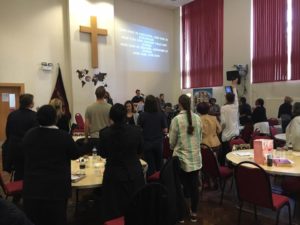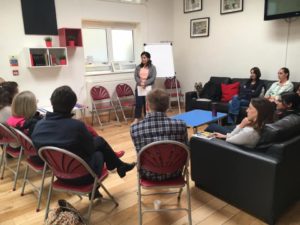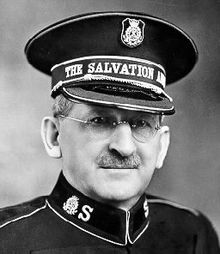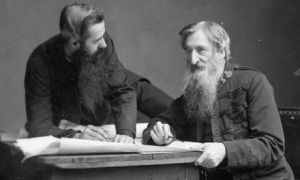Guest post by Captain Sandra Pawar
 In 1912, General William Booth, founder of The Salvation Army, entered the Royal Albert Hall in London to give his last, most notable address to a packed crowd of 7,000 Salvationists. The most famous part of this speech is:
In 1912, General William Booth, founder of The Salvation Army, entered the Royal Albert Hall in London to give his last, most notable address to a packed crowd of 7,000 Salvationists. The most famous part of this speech is:
“While women weep, as they do now, I’ll fight
While little children go hungry, as they do now, I’ll fight
While men go to prison, in and out, in and out, as they do now, I’ll fight
While there is a drunkard left,
While there is a poor lost girl upon the streets,
While there remains one dark soul without the light of God,
I’ll fight-I’ll fight to the very end!”
I have always loved this part of his speech and found it incredibly powerful. I loved the heart and passion behind it. I believe it was not only relevant for what was needed in the early century but I believe it is still relevant today and a call to mission for us.
There are still women weeping and there are still young girls lost upon the streets and there is still a need for people to fight for and with them.
There are women and young girls being trafficked around this world and in this country on a daily basis, there are women and young girls being exploited, there are women and young girls who have no safe place to live, there are women and young girls who are being abused by husbands and boyfriends. There are babies being murdered just because they are girls. There are women and young girls who are fleeing war torn countries only to be put on boats that sink or sent to refugee camps that are in incredibly bad condition offering barely any hope.
It is for these young girls and for these women that we must learn to fight.
As followers of Jesus Christ we have strategic responsibility to become aware of the conditions for many young girls and women not only around the world but in our local communities and we need to raise the alarm to others and we must do something with what we know.
I feel like my life has been full of different experiences that have led me to having this full on passion to do something for women and because of all these different experiences whether it be working with young homeless girls on the streets of Sydney who were being prostituted by other homeless young people or whether it be the older women I met in the women’s shelter who were being abused by their lovers and husbands or the women I met in the strip clubs in Atlanta or the rescued young girl with AIDS in India who did henna on my feet for my wedding as a way to escape the red light district. Each one of these women that I have met has stirred a deep passion in me to fight for them and with them.
God has a deep deep love for women, for girls and now that I am aware of all the various circumstances women and young girls find themselves in and the often horrific situations they face I cannot stand back and pretend it doesn’t happen. I must do something.
 So the justice conference “While Women Still Weep” held at Southwark Corps recently was my effort to do something. An effort to bring awareness to others, to create a day, a moment where God could speak and stir our hearts to action. We had speakers from International Justice Mission talking about the international efforts being made to rescue and restore, we had speakers from local Salvation Army chapters like Faith House and the Territorial department for Anti Human trafficking to give us information on local situations and how we could join the fight. A representative from Citizens Uk was there to speak about the importance of listening to people’s stories and Stephanie Chagis Bijl talked about joining the justice fight through prayer.
So the justice conference “While Women Still Weep” held at Southwark Corps recently was my effort to do something. An effort to bring awareness to others, to create a day, a moment where God could speak and stir our hearts to action. We had speakers from International Justice Mission talking about the international efforts being made to rescue and restore, we had speakers from local Salvation Army chapters like Faith House and the Territorial department for Anti Human trafficking to give us information on local situations and how we could join the fight. A representative from Citizens Uk was there to speak about the importance of listening to people’s stories and Stephanie Chagis Bijl talked about joining the justice fight through prayer.
 It was a day where hopefully people came away with some practical tools and ideas on how they could join the fight. Once you know, you can no longer stand back and do nothing.
It was a day where hopefully people came away with some practical tools and ideas on how they could join the fight. Once you know, you can no longer stand back and do nothing.
Some of the steps that people have been encouraged to take after the conference are:
- Look into partnering with Citizens UK or any other organization that fights against injustice in their local communities
- Set aside time to pray daily for any issue that God has laid on their heart in regards to the injustices facing women and children. One such prayer need was cyber trafficking especially in Thailand
- Volunteer to be either a driver or passenger for the Anti Human trafficking department’s transportation program
- Volunteer with Faith House on their prayer walks and ministry with exploited women
- Give financially to an organisation that is making a difference in the lives of women and children
- Bring awareness to others about these issues and encourage others to take action
- Think about purchases you make and how they may be affecting women and young children around the world. Buy ethically.
- Attend the next ‘While Women Still Weep Justice Conference ‘on March 18th 2017
While Women STILL weep….I will fight.
 Sandra Pawar is currently the Corps Officer at Southwark Corps. She is passionate about seeing broken lives made whole, captives set free and chains of injustice broken.
Sandra Pawar is currently the Corps Officer at Southwark Corps. She is passionate about seeing broken lives made whole, captives set free and chains of injustice broken.
 rom the introduction to: Alinsky, S. D. (1970). John L. Lewis, an unauthorized biography. New York, Vintage Books. Pages ix-xiv
rom the introduction to: Alinsky, S. D. (1970). John L. Lewis, an unauthorized biography. New York, Vintage Books. Pages ix-xiv
 In 1912, General William Booth, founder of The Salvation Army, entered the Royal Albert Hall in London to give his last, most notable address to a packed crowd of 7,000 Salvationists. The most famous part of this speech is:
In 1912, General William Booth, founder of The Salvation Army, entered the Royal Albert Hall in London to give his last, most notable address to a packed crowd of 7,000 Salvationists. The most famous part of this speech is: So the justice conference “While Women Still Weep” held at Southwark Corps recently was my effort to do something. An effort to bring awareness to others, to create a day, a moment where God could speak and stir our hearts to action. We had speakers from International Justice Mission talking about the international efforts being made to rescue and restore, we had speakers from local Salvation Army chapters like Faith House and the Territorial department for Anti Human trafficking to give us information on local situations and how we could join the fight. A representative from Citizens Uk was there to speak about the importance of listening to people’s stories and Stephanie Chagis Bijl talked about joining the justice fight through prayer.
So the justice conference “While Women Still Weep” held at Southwark Corps recently was my effort to do something. An effort to bring awareness to others, to create a day, a moment where God could speak and stir our hearts to action. We had speakers from International Justice Mission talking about the international efforts being made to rescue and restore, we had speakers from local Salvation Army chapters like Faith House and the Territorial department for Anti Human trafficking to give us information on local situations and how we could join the fight. A representative from Citizens Uk was there to speak about the importance of listening to people’s stories and Stephanie Chagis Bijl talked about joining the justice fight through prayer. It was a day where hopefully people came away with some practical tools and ideas on how they could join the fight. Once you know, you can no longer stand back and do nothing.
It was a day where hopefully people came away with some practical tools and ideas on how they could join the fight. Once you know, you can no longer stand back and do nothing. Sandra Pawar is currently the Corps Officer at Southwark Corps. She is passionate about seeing broken lives made whole, captives set free and chains of injustice broken.
Sandra Pawar is currently the Corps Officer at Southwark Corps. She is passionate about seeing broken lives made whole, captives set free and chains of injustice broken. 
 He was as good as his word. The remarkable campaign that followed with help from reformer Josephine Butler, journalist W T Stead and Salvationists up and down the land brought about a change in the law. The campaign involved the publishing of shocking stories in the press, a 2 mile long petition delivered to the door of parliament and the buying of a child. Yes, that’s buying a child – to prove it could be done in London for £5. The result of that action was a date in court for Bramwell. After a 12 day trial that held the attention of the country, he was acquitted, although Stead was jailed for 3 months. At the time many feared it would be the end of The Salvation Army with the Founder’s Son and Chief of Staff in the dock of the Central Criminal Court. And yet as Bramwell later reflected when General:
He was as good as his word. The remarkable campaign that followed with help from reformer Josephine Butler, journalist W T Stead and Salvationists up and down the land brought about a change in the law. The campaign involved the publishing of shocking stories in the press, a 2 mile long petition delivered to the door of parliament and the buying of a child. Yes, that’s buying a child – to prove it could be done in London for £5. The result of that action was a date in court for Bramwell. After a 12 day trial that held the attention of the country, he was acquitted, although Stead was jailed for 3 months. At the time many feared it would be the end of The Salvation Army with the Founder’s Son and Chief of Staff in the dock of the Central Criminal Court. And yet as Bramwell later reflected when General: